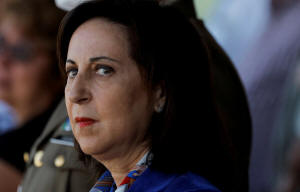|
Cluster munitions are prohibited by more than 100 countries,
including Spain. They typically release large numbers of smaller
bomblets that can kill indiscriminately over a wide area. Those
that fail to explode pose a danger for decades.
"Spain, based on the firm commitment it has with Ukraine, also
has a firm commitment that certain weapons and bombs cannot be
delivered under any circumstances," Margarita Robles told
reporters during a rally in Madrid ahead of the July 23 national
election.
"No to cluster bombs and yes to the legitimate defence of
Ukraine, which we understand should not be carried out with
cluster bombs."
Robles said the decision to send cluster bombs was a decision
taken by the U.S. government, not by NATO, of which Spain is a
member. There is broad support among Spanish parties for backing
Ukraine and providing military aid for the war.
Russia, Ukraine and the United States have not signed on to the
Convention on Cluster Munitions, which bans production,
stockpiling, use and transfer of the weapons.
White House national security adviser Jake Sullivan said Ukraine
had provided written assurances that it was going to use them
"in a very careful way" to minimise the risk to civilians.
Asked why he was providing the cluster munitions now, President
Joe Biden told reporters that it was because the effort to
defend against Russia had "run out of ammunition".
(Reporting by Graham Keeley; Editing by Alison Williams)
[© 2023 Thomson Reuters. All rights
reserved.] Copyright 2022 Reuters. All rights reserved. This material may not be published,
broadcast, rewritten or redistributed.
Thompson Reuters is solely responsible for this content.

|
|




